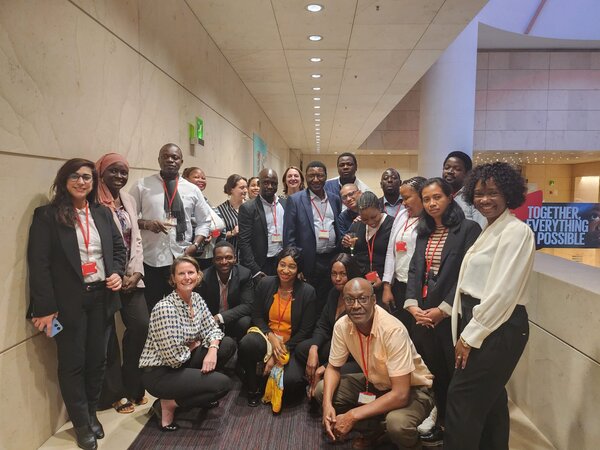
Innovation and partnerships to unlock sustainable investments in Africa
Matching Africa’s natural and human capital with financial capital is vital for its sustainable development. Societe Generale is deploying the know-how and experience of its teams to design innovative financings for the continent’s emerging entrepreneurs and impactful projects.
Energy, mobility, water, healthcare, digitalisation... the infrastructure deficit on the African continent is considerable. According to a recent OECD report, Africa would need at least USD 1,600 billion by 2030 to achieve the UN’s Sustainable Development Goals (SDGs)1.
A fresh approach for the continent’s high impact projects
"To contribute to Africa's sustainable development, our aim is to deploy innovative financing solutions to support new investments that meet the continent's needs," says Marie-Aimée Boury, Head of Impact Based Finance at Societe Generale. The challenge lies not only in the scale of the investment gap mentioned above. The nature of investments has changed, largely due to the impact of technological innovations and changes in the African economy. Small-scale projects are on the rise, as in solar energy for example, with decentralised projects coupled with battery storage becoming central to African countries’ clean power strategy. The emergence of start-ups and African champions has led to the development of new, more agile players with more transparent digital solutions. The African financial landscape is undergoing a real transformation. As Marie-Aimée Boury points out, "In addition to major projects, which are very slow to materialize, there is an increasing demand for financing of small-scale assets, which is why we need to adopt a different approach. The challenge is, on the one hand, to originate all these smaller size projects and find a way of aggregating them efficiently and, on the other hand, to de-risk their financing by onboarding catalytic capital partners”.
The importance of mutually beneficial partnerships
The case of Spiro, which has launched an innovative model of electric motorbike taxis in Benin and Togo, is exemplary on many accounts. In addition to its existing fleet of over 9,000 vehicles and 250 recharging stations, the company plans to more than double the number of vehicles and quadruple the number of recharging stations. "This is a project that fits in perfectly with the country’s sustainable development goals: reducing greenhouse gas emissions, improving public health, creating jobs and integrating at least 30% women into the workforce," explains Marie-Aimée Boury. Societe Generale's structured finance team, based in Abidjan, arranged a credit facility of FCFA 37.8 billion (USD 63 million), with an initial tranche of FCFA 21 billion (USD 35 million) backed by a 70% partial credit guarantee provided by GuarantCo, a public development finance institution.
Indeed, to enable the bank to enter new markets, identifying catalytic partners such as development banks, guarantee institutions, investment funds, philanthropic foundations, etc., is a key element, as they help to 'de-risk' projects by providing guarantees and sharing knowledge about these still nascent business models. Another example of this new type of cooperation is Societe Generale's investment in the Afrigreen impact fund, which provides loans for small-scale decentralised solar projects that displace highly polluting electricity generators. "We are working with this experienced and agile team on a partnership basis, both for the origination and structuring of joint financing" notes Marie-Aimée Boury.
Tailoring bespoke solutions and engaging in thought leadership
One of Societe Generale's key assets is its solid and historic presence on the continent, with 17 universal banking subsidiaries. This deep-rooted presence means that we are familiar with the local context and players, and it makes it easier to monitor the implementation of the projects financed. Our subsidiaries are supported by the bank’s structured finance platform, based in Abidjan, and the specialists’ teams based in Paris. They have longstanding experience of financing companies and projects in Africa, including in countries where the bank has no local presence, particularly through the arrangement of large-scale export finance.
Thanks to this three-tier structure (local experts, international experts and external partners), Societe Generale can respond to the precise financial needs of project sponsors. In particular, the Group can structure ‘multi-source’ financing that combines, for example, medium-term loans in local currency to limit exchange rate risk, with long-term export financing in foreign currency. "To be able to scale up and address the significant investment gap which amounts to hundreds of billions every year, we must collectively improve the credit enhancement tools necessary for commercial banks and private investors to deploy more capital in the continent" says Marie-Aimée Boury.
"We are also going further and proposing new ideas to governments to rethink the way public money is used in order to mobilise more private money. For instance, we made some very concrete proposals at the Paris Summit for a New Global Financial Pact last June, which are now being taken forward by the Institut de la Finance Durable and the Fédération des Banques Françaises as part of the Paris Dialogue."
Sharing best practices and on-hands training with African civil servants
To accelerate the emergence of sustainable and bankable infrastructure projects, Societe Generale is playing an active role in training and sharing best practices with African administrations. For example, Societe Generale has supported the African Infrastructure Fellowship Program (AIFP) since Meridiam and the Global Infrastructure Hub launched it four years ago. |
1) https://www.oecd-ilibrary.org/sites/3269532b-en/index.html?itemId=/content/publication/3269532b-en
